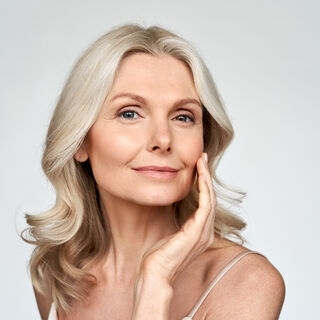Sex
The "Invisibility" War on Older Women
When women shame each other for how we present, all women lose.
Posted February 4, 2022 Reviewed by Tyler Woods
Key points
- In a culture that tells us women are most attractive before they're even of legal drinking age, middle age brings complex messages.
- While some women may delight in feeling removed from the "male gaze," others feel their sexiest and most authentic selves after menopause.
- Instead of judging other women's sexual self-presentation, perhaps the real question is, "What is visibility, anyway?"
- When we recognize people of any gender for the things they want to be recognized for, we are all more free.
“I’m invisible.”
It’s impossible to keep track of how many times I’ve heard or read this statement from women—some as young as 40, but increasingly as menopause hits, and beyond. First, let’s be clear: quite a number of these women are not issuing a lament but a proclamation of relief. "Finally, I’m not being ordered to smile by random men on the street!" or, "I can be a person in the world without constantly being sexually harassed and subjected to the male gaze!" Others, however, are less overjoyed. Some miss the attention they once received. Far more may be thrilled to be ignored by strangers, but feel frustration, grief, or shame around the de-sexualization pushed upon them by all corners, from being commanded by magazines to cut their hair and dress in “age-appropriate” fashion (that offensively includes everything from no longer baring upper arms to not wearing jeans). None of this even begins to touch on the consternation of middle-aged and older women attempting to date, only to find that the men they consider viable partners are strictly interested in women fifteen years their junior.

There is, of course, a loud, proud, and vocal contingent of women-of-a-certain-age who denounce these “invisibility” claims as either internalized misogyny or as women “giving up” and no longer caring about being attractive and sexy. They may cringe when yet another peer in their age demographic claims to be post-sexual, no longer interested in—or of interest to—prospective romantic partners, and abandons make-up, heels, or other markers of conventional femininity. This “still got it” population—increasingly reflected in the media, such as in The Divorce, as well as, And Just Like That (and other shows that do not star Sarah Jessica Parker!)—rejoices in the confidence age has bestowed upon them, delights in sex without the complications of pregnancy scares, feels more empowered in owning their desires rather than merely responding more to being desired, and sometimes also enjoys greater disposable income than they did in their youth, employing personal trainers, dashing in for Botox on their lunch breaks, and donning luxurious fabrics that make them feel hotter than ever.
Just as there have, for decades, been the (misogynistically named) “Mommy Wars” between mothers who work outside the home and those who stay home with kids, who breastfeed and those who use formula, those who home-birth and those who enthusiastically beg for epidurals, and every other possible difference that can exist in parenting styles, so do "Invisible Women" sometimes feel judged by the "Still Sexy Contingent," countering the idea that their invisibility is a result of “giving up” with the assertion that postmenopausal women running around in revealing clothing, posting provocative selfies, and talking openly about their dating or sexual lives are “trying too hard” at best or “desperate and needy” at worst. Flip this script, too, as the judgment runs both ways.
It’s crucial to note that opposing factions of women are rarely born in some destructively stereotypical “women hate other women” vacuum, but rather are carefully nursed in the hothouse laboratory that is patriarchy. The busier women are kept by pointing fingers at one another as the problem, the less attention goes to...well, The Problem. And, make no mistake, the problem of women, age, and perceived attractiveness is very real. As I explore in my memoir, Blow Your House Down: A Story of Family, Feminism, and Treason, while the sexualization of girls begins far too early, the de-sexualization of women sets in disturbingly young. “Various recent studies using extensive data from online dating sites have revealed that women’s perceived attractiveness by men hits its highest point at the age of eighteen and declines steadily thereafter,” writes Elizabeth Burch. According to Christian Rudder, co-founder of OkCupid, the peak age of women’s attractiveness is somewhere around twenty-two or twenty-three, with Rudder stating, “Younger is better and youngest is best of all.” Men, on the other hand, are seen as reaching their peak sexual attractiveness between forty-six and fifty. (Yes, you are excused to go barf—daintily, of course.)
Since the beginning of the pandemic, there have been countless articles about women going gray—initially due to salons being closed, but increasingly with volition and pride. Though most women who have written about their experiences have ended up pleased with the results (articles abound about all the women who are never going back), many also expressed deep anxiety about the way gray hair would change their social identities, and revealed that the pressure to keep dying came mainly from their female stylists, mothers, and friends, who told them they would look like their children’s grandmothers, or even that gray might compromise their ability to move up the ladder at work. To gray or not to gray, if we aren’t careful, can become just one more piece of ammunition in the covert arms trade to women intended to keep us on opposite sides of fractioning lines.
There is far too much complexity to the real divisions between women to reduce them all to any simple equation. But, what is clear is that the more women disagree about matters such as whether or not to use a filter in a selfie or whether it is empowering or desperate to be an openly sexual being past forty-five, the more we do the work of keeping each other shamed and small while the patriarchy cracks open a cold one and put its feet up. Gendered oppression breeds in its most fertile grounds when women ourselves are eager to cast the first stone. With reproductive freedom at stake, and some three-quarters of those who have lost jobs in the pandemic being women, and with real issues on the table such as abled, affluent, white cis feminists still often being oblivious to the issues faced by their Black, brown, trans, disabled, and poor sisters—it seems perhaps the least we can do to not further demonize each other for whether or not we wish to be visible.
Rather, perhaps the more vital question is and has always been: Invisible to whom, anyway?
If the pandemic has taught us anything, it’s that humans are social creatures—that even the most introverted are not meant to live in the confines of a Brady Bunch Zoom square. As people, we want to be seen...but seen for reasons that make us feel good, not exploited (much less terrorized). While some of us are having plenty of pandemic sex, and others are having none, and some are happy or unhappy about each of these things in turn, we have all experienced moments of loneliness due to a lack of spontaneous social interaction and instances of positive touch we once took for granted. Visibility is not confined to the assholes who yelled obscenities out of car windows when we were young, but includes our right to recognition, to be seen for who we really are, to be appreciated. For some, this appreciation includes their identity as sexual and sexy, and for others, that’s either fallen by the wayside or was never of much interest. While few genuinely wish to be Invisible in an absolute sense, everyone wants to feel safe and not an object of prey.
What might it look like, then, if the next time we see another woman—of any age—instead of judging her fashion choices and sexual persona, we simply saw someone doing her best in a world too often stacked against her? What if we considered the utter lack of “hot takes” about men going gray or what, exactly, a man has the right to wear when being photographed, and considered granting this same grace to women? What if we dared to take the leap of leaving no woman behind for the things that matter to her, instead of declaring her either invisible or desperate for not presenting outwardly in ways we may like to present? What if the response to the Invisibility Wars was, instead, "I see you as you would most like to be seen. I see you, and rejoice with you that you are not 18 anymore, and I would like to go back in time and tell that young girl that she was glorious, but that she is even better now?"
What if we square our shoulders and acknowledge that we are not obligated to keep fighting amongst ourselves to deflect attention.
I see you. Here I am. Now, where do we go from here?


